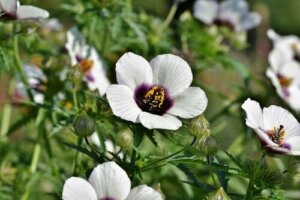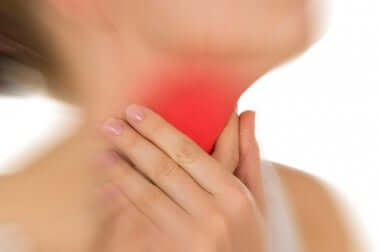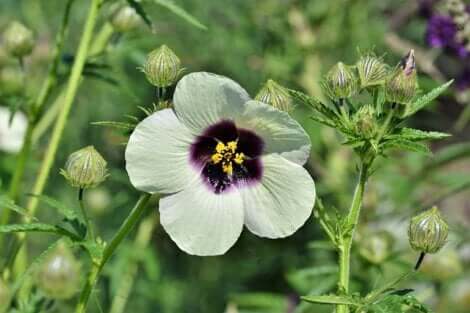Marshmallow Root: Benefits and Side Effects


Written and verified by the doctor Leonardo Biolatto
Marshmallow root (Althaea officinalis) is a brown fibrous husk that comes from the marshmallow plant, a perennial native to Europe, Western Asia, and North Africa. Its extracts are used to make cough syrups and skin products.
Beyond this, it seems to have other medicinal uses because of its properties. However, for now, there’s still no solid evidence on its health benefits, since scientific studies have been small and inconclusive.
Therefore, although some people use it as an herbal supplement, it’s not accepted as a first-line treatment for illnesses. Also, because of its possible side effects and interactions, we recommend consulting a doctor before trying it.
Marshmallow root benefits
The medicinal properties of marshmallow roots come from its mucilage content. This is a gelatinous vegetable substance, similar to a sap, which is used as a thickener.
In fact, the sweets we call marshmallow got this name because originally manufacturers used this root. However, nowadays, they don’t use this herb, and they use sugar and gelatin instead.
Going back to the main topic, marshmallow root mucilages have antioxidant activity, and overall evidence suggests that they help against skin irritation and digestive problems. Do you want to know more about it? We’ll show you some of its main benefits below.
Helps treat colds and coughing

Some cough syrups and lozenges use marshmallow root as an ingredient. This is because the mucilage it contains can line the esophagus, reducing the irritation. In a study published by Complementary Medicine Research, some supplements with extracts of this root helped with dry coughing.
Meanwhile, a small study reported in the Avicenna Journal of Phytomedicine found that kids who consumed a mixture of herbs, like marshmallow root, chamomile, and sage, had less severe cough and fewer nighttime awakenings compared to those who took a placebo.
Therefore, some people think marshmallow root can be useful against cold and flu symptoms. However, more evidence is needed. Still, you can drink it in the form of tea, pills, or syrup.
Be sure to visit: Find Quick Relief from the Flu with Elderberry
Soothe irritated skin
The anti-inflammatory effect from marshmallow root could help calm skin irritation for furunculosis, eczema, or dermatitis. A review in Advances in Dermatology and Allergology found that an ointment with 20% marshmallow root extract was helpful against irritated skin.
Also, it has been suggested that applying ointments topically with these extracts help with the negative effects of UV rays or sun exposure. Of course, you shouldn’t use it as a substitute for sunscreen because it doesn’t provide enough protection.
Protection against ulcers
On its own, marshmallow root extract can’t prevent ulcers from forming. However, in conjunction with healthy habits, it can help reduce the risk. This is shown in a study in Pharmaceutical and Biosciences Journal.
The researcher suggests that the mucilages and flavanoids of this plant are responsible for this effect. In particular, they seem to cover and protect the mucous lining of the digestive system, which reduces ulcer formation.
Other possible benefits of marshmallow root
- Herbal remedies with this substance may help with dry mouth.
- Some think that this plant can also help heal wounds. Also, it can even decrease the risk of infection.
- It has diuretic properties that can help eliminate retained fluids in the body. However, be careful, especially if you’re using other treatments.

Marshmallow root side effects
In most healthy adults, it’s easy to tolerate this plant, and it doesn’t cause side effects in moderate doses. However, some people do get an upset stomach or feel dizzy. Given this, we recommend starting with a low dose, until reaching the dose your doctor or the supplement manufacturer suggests.
Now, according to information from WebMD, in some people, it can cause low blood sugar levels. Also, due to the lack of evidence on its safety and efficacy, you should avoid it in the following cases:
- Pregnancy and lactation.
- Hemorrhagic disorders.
- Diabetes.
- Before and after surgical procedures.
In general, it might react with lithium, diabetes medications, and medications taken by mouth. Therefore, before taking it, it’s best to talk to your doctor.
All cited sources were thoroughly reviewed by our team to ensure their quality, reliability, currency, and validity. The bibliography of this article was considered reliable and of academic or scientific accuracy.
- Tabarsa, M., Anvari, M., Joyner (Melito), H. S., Behnam, S., & Tabarsa, A. (2017). Rheological behavior and antioxidant activity of a highly acidic gum from Althaea officinalis flower. Food Hydrocolloids, 69, 432–439. https://doi.org/10.1016/j.foodhyd.2017.02.009
- Fink, C., Schmidt, M., & Kraft, K. (2018). Marshmallow root extract for the treatment of irritative cough: Two surveys on users’ view on effectiveness and tolerability. Complementary Medicine Research, 25(5), 299–305. https://doi.org/10.1159/000489560
-
asma javid, nasrinsadat motevalli haghi, Ahmad Emami, aida ansari, seyed abbas zojaji, maryam Khoshkhui, & Hamid Ahanchian. (2018). Short-course administration of a traditional herbal mixture ameliorates asthma symptoms of the common cold in children. Avicenna Journal of Phytomedicine, Online First. https://doi.org/10.22038/ajp.2018.11678
- Dawid-Pać R. Medicinal plants used in treatment of inflammatory skin diseases. Postepy Dermatol Alergol. 2013;30(3):170‐177. doi:10.5114/pdia.2013.35620
-
Zaghlool, S. S., Shehata, B. A., Abo-Seif, A. A., & Abd El-Latif, H. A. (2015). Assessment of Protective Effects of Extracts of Zingiber officinale and Althaea officinalis on Pyloric Ligation-Induced Gastric Ulcer in Experimental Animals. UK Journal of Pharmaceutical Biosciences, 3(4), 48. https://doi.org/10.20510/ukjpb/3/i4/89472
- Rezaei M, Dadgar Z, Noori-Zadeh A, Mesbah-Namin SA, Pakzad I, Davodian E. Evaluation of the antibacterial activity of the Althaea officinalis L. leaf extract and its wound healing potency in the rat model of excision wound creation. Avicenna J Phytomed. 2015;5(2):105‐112.
- Skrinjar, I., Vucicevic Boras, V., Bakale, I., Andabak Rogulj, A., Brailo, V., Vidovic Juras, D., … Vrdoljak, D. V. (2015). Comparison between three different saliva substitutes in patients with hyposalivation. Clinical Oral Investigations, 19(3), 753–757. https://doi.org/10.1007/s00784-015-1405-8
- Shiffa, M., Aslam, M., Fahamiya, N., & Muzn, F. (2016). Unani perspective of Khatmi (Althaea officinalis). Journal of Pharmacognosy and Phytochemistry JPP, 357(56), 357–360. Retrieved from http://www.phytojournal.com/archives/2016/vol5issue6/PartE/5-6-35-802.pdf
This text is provided for informational purposes only and does not replace consultation with a professional. If in doubt, consult your specialist.








